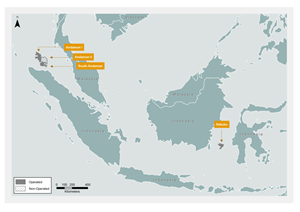(Bloomberg) --Indonesia will continue diplomatic talks with Malaysia over the oil-rich blocks in disputed waters instead of pursuing legal action, according to a senior official.

“There’s a territorial border between Germany and the Dutch that hasn’t been settled in 300 years. If the Dutch and the Germans couldn’t finish in 300 years, why should we finish in 10?,” Indonesia Deputy Foreign Minister Arif Havas Oegroseno said in an interview on Friday. If the talks between the Southeast Asian nations “take a long time, so be it.”
The dispute involves overlapping claims to the continental shelf and exclusive economic zone off the eastern coast of Borneo—known as Ambalat in Indonesia and Sulawesi Sea in Malaysia. A military standoff in 2005, sparked by Malaysia’s decision to grant oil exploration rights to Shell Plc in the contested zone, marked the last major escalation.
Jakarta prefers to keep the matter at the negotiating table rather than seek international arbitration. The stance reflects Indonesia’s broader approach to maritime disputes—such as those in the Natuna Sea with China—which prioritizes stability and bilateral engagement over fast, binding settlements that could carry political and economic risks.
The Indonesian official’s comments came as Malaysia’s foreign ministry stressed that discussions for a possible joint development remain at an early stage and have yet to produce a final agreement. Malaysia’s clarification underscored lingering caution between the two sides, despite the leaders’ public statements.
In late June, Indonesian President Prabowo Subianto and Malaysian Prime Minister Anwar Ibrahim agreed in principle to explore a joint development plan as a pragmatic alternative to a full legal settlement.
“There is goodwill from both sides,” Prabowo said, when asked for comment on Aug. 7. “The point is, we want a good resolution.”
Before recent pronouncements, the two countries have opted for quiet, twice-yearly negotiations covering both land and maritime boundaries. Oegroseno, who then led the talks, said personal ties between the chief negotiators on both sides have helped keep communications smooth.
Indonesia bases its maritime claims on the 1982 United Nations Convention on the Law of the Sea, while Malaysia relies on its 1979 maritime map and a 2002 International Court of Justice ruling that granted it sovereignty over Sipadan and Ligitan islands, without settling the maritime boundary.
“Boundary negotiations are the most complicated ones because once an agreement is reached, it cannot be changed,” said Oegroseno. “We need to have legal certainty.”
- Stena Drilling为rig quartet提供新的交易和扩展
- India cancels pair of offshore wind tenders over lack of interest
- HD Hyundai’s new Philippine yard to open in January with capacity for 10 ships a year
- 杨义兴:根治疑难杂症的“油井神医”
- 海员:Sim船将于今年10月下水
- Pole Star Global buys Clearwater Dynamics
- 新疆第十三师新星市2025年市场化并网新能源项目公示
- Safe Bulkers sheds second vintage kamsarmax
- Seafarer: The Ship Sim to launch this October
- 塔里木油田:聚焦三大主业发展深地新质生产力




